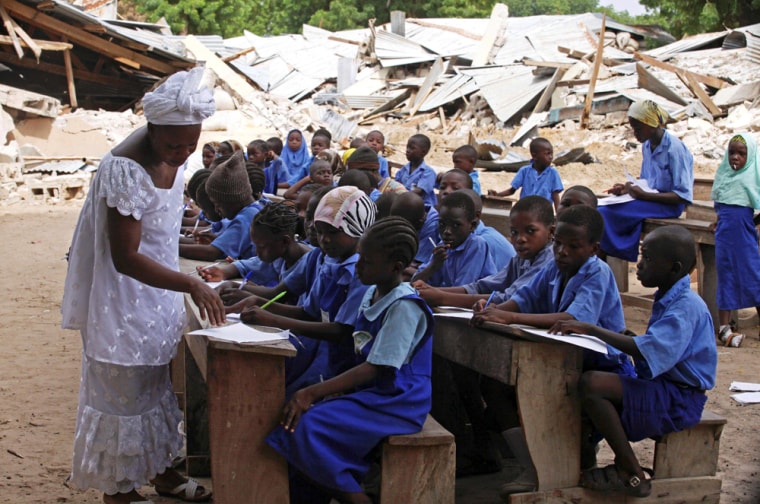They came in the night, screaming as they attacked policemen and soldiers in a series of assaults that escalated into a bloodbath that left more than 700 people dead.
Victims described the July 26 onslaught Tuesday, detailing highly coordinated and ruthless attacks by the radical Islamist sect, Boko Haram.
From hospital beds with family members kneeling at their feet, survivors said attackers used guns, knives and machetes — the latter to avoid accidentally shooting each other — as they swept through military barracks, police stations, homes of law enforcement officials and at least 22 churches.
They said Nigerian security forces had been unprepared for the militant offensive that spread last week to four states in northern Nigeria, even though moderate Muslim clerics had sounded warnings about the group.
"We were instructed that funny things were about to happen and that someone was going to attack the police station," said Hassan Ibrahim, a 29-year-old policeman in Maiduguri, the capital of Borno, who was recovering from stab wounds.
Still, he was unprepared as he stood guard at his police station two days after the warning, and despite knowing that sect members had recently robbed policemen in a different area of weapons.
Abubakr Mohammed, a 33-year-old policeman who was shot in the torso, was at a different police station in Maiduguri when it was attacked about midnight by militants shouting "Allahu akbar," or "God is great."
"We heard our colleagues had been attacked in Bauchi (state), but we never expected them to come to our own place and attack us," he said from his hospital bed.
Government's ability to respond in question
The survivors' accounts raise questions about the ability of the government of Africa's most populous nation to respond to threats, and about the nature of the training received by the sect. Nigerian forces finally stormed Boko Haram's headquarters in Maiduguri on July 29 after bombarding it with mortars and grenades, killing about 100 militants.
The compound — which stretched some 2.5 miles — was reduced to a heap of smoking rubble. It was guarded this week by heavily armed soldiers and surrounded by barbed wire.
Human rights groups allege many civilians were also slain as the police and army hunted down militants. The police shot the sect's charismatic leader, Mohammed Yusuf, on July 30 after he was captured although they say it was in a shootout.
Extremist groups have emerged in recent years in Africa, posing dangers beyond the continent. The threat was underscored Tuesday when Australian police thwarted an alleged terrorist plot in which extremists with ties to an al-Qaida-linked Somali group planned to attack an Australian military base with automatic weapons.
'Western education is sacrilege'
In Nigeria, one of Africa's top oil producers, theft of oil revenues by corrupt politicians has angered many Nigerians living in abject poverty and has strengthened the appeal of groups like Boko Haram, whose name means "Western education is sacrilege." U.S. Secretary of State Hillary Rodham Clinton, who began an Africa tour on Tuesday, plans to address these issues with Nigeria's leaders when she visits the country next week.
Boko Haram sought to impose strict Islamic law and abolish Western education in the secular nation of 140 million, which is roughly divided between Muslims in the north and Christians in the south.
The militants were well organized. In Maiduguri, they attacked the homes of at least two senior police officers — one in charge of the training school, the other the second in command of the paramilitary Mobile Police unit — at the same time they hit the police stations and army barracks.
Another detachment attacked Maiduguri's churches. The Rev. Ishaka Dauda, pastor of one of the churches, said around 100 attackers scaled a 10-foot wall and hid in the church's primary school until the entire group was inside. They then burst out together, torching cars and buildings and throwing homemade bombs powerful enough to crack the church's concrete floor.
"You could hardly tell them from a Nigerian soldier except their trousers were shorter," Dauda said.
Trousers that stopped mid calf were part of the sect's uniform.
Members destroy six churches
The Boko Haram members methodically destroyed all six churches in Maiduguri's Wulari district. At Elijah Apostolic Christ Church, the attackers arrived with axes to chop through iron bars and wooden doors, said pastor Olushola Joseph. Once inside, he said, they set the place ablaze.
Thomas Peter, a religion scholar who was hacked with a machete as he tried to protect his father's Church of Christ, said he heard the fighters caution each other not to use their guns to prevent them from accidentally shooting each other. They burned down the church and came back two days later and burned down the house of his father.
The violence also took a toll on family members of those who joined the sect.
Six-year-old Umar Mohamed wept Monday as his brother recounted watching sect members prepare for battle with bombs, swords and knives.
"I don't know where my parents are," whispered Abdullahi, his trousers ragged and dirty from the ground of the police station where sect members' families are being sheltered. "My father brought me here to study the Koran ... then they were killing people. I heard them."
